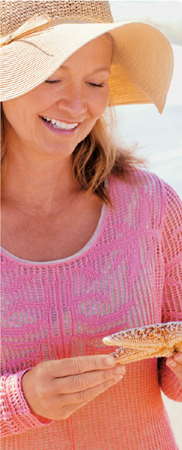 65) and moderate exercise (
65) and moderate exercise ( 66) can actually improve your response to vaccines! If you do still get the flu, it will likely be milder than if you hadn’t been vaccinated, and therefore less likely to progress to something more dangerous.
66) can actually improve your response to vaccines! If you do still get the flu, it will likely be milder than if you hadn’t been vaccinated, and therefore less likely to progress to something more dangerous.It seems unfair, but as you get older and your immune system slows down, your risk of getting sick increases. Then, in the spirit of kicking you while you’re down, getting an infection like bronchitis or the flu can weaken your immune system even more and increase your chances of developing a more severe illness, such as pneumonia, that takes a long time to recover from and can bring potentially deadly complications. So preventing relatively mild conditions like colds, sinus infections, or strep throat relieves stress on your immune system, allowing it to function optimally and focus on keeping heavy hitters like pneumonia, cancer, and other chronic diseases at bay.
Taking antibiotics to treat an infection or other condition can also weaken your immune system. In fact, a 2005 study in the Archives of Dermatology found that patients taking antibiotics long-term had twice the risk of developing upper respiratory tract infections. Antibiotics wipe out the “good” bacteria along with the bad, and upsetting the balance between the two compromises your immune response—specifically, the function of white blood cells called neutrophils, suggests a 2007 study in Nature Medicine.
All the tips in part VI will strengthen your natural defenses and help you ward off infections and diseases. As you get older, it’s especially important to practice basic habits that keep you from getting every bug that goes around. That means washing your hands with soap and water regularly (or using an alcohol-based sanitizer if you don’t have access to water), not touching your face, coughing and sneezing into a tissue or your elbow, cleaning shared surfaces like phones and keyboards frequently, and avoiding crowds during cold and flu season.
You should also get a flu shot, and make sure you’re up to date on other vaccines, such as whooping cough. Only about 65 percent of older people get the flu vaccine (and as few as 30 percent of people with high-risk conditions such as diabetes and heart disease), according to the Centers for Disease Control and Prevention. Even though the annual shots don’t work as well for aging immune systems as they do younger ones, they still offer critical protection and give your immune system a jump-start on fighting off the infection. Remember that an optimistic outlook ( 65) and moderate exercise (
65) and moderate exercise ( 66) can actually improve your response to vaccines! If you do still get the flu, it will likely be milder than if you hadn’t been vaccinated, and therefore less likely to progress to something more dangerous.
66) can actually improve your response to vaccines! If you do still get the flu, it will likely be milder than if you hadn’t been vaccinated, and therefore less likely to progress to something more dangerous.

If you do get sick and end up with a fever, you should let it run its course. Except for certain groups of people, such as the very young and the very old, or people with certain medical conditions such as heart or lung disease, doctors no longer recommend suppressing a low-grade fever. That’s because a low-grade fever actually helps your body fight off infection; a higher body temperature makes it harder for germs to grow and multiply, and it activates the immune system, helping it to respond faster to invaders. That said, if your fever has lasted more than three days, or if your temperature is more than 103°F (39°C), you should call your doctor.
Also, don’t ask your doctor for antibiotics if you don’t need them. Colds and flus are viral infections, for example, and won’t respond to antibiotics. However, if you do have to take antibiotics, eat a cup of yogurt with live and active cultures daily until you’ve finished the full course and for a few days afterward to replenish immune-supporting “good” bacteria in your digestive tract. Alternatively, you can take a probiotic supplement, which contains much higher amounts of friendly bacteria. Check the expiration date, and look for products that provide billions of “colony forming units” (CFUs) and contain strains of Bacillus coagulans, Lactobacillus GG, or Bifidobacterium. (Other strains may not survive the acidic environment of the stomach and make it to your lower GI tract, where they’re needed.) Follow the package directions for dosing, and store the package in the refrigerator to protect it from heat, moisture, and air.